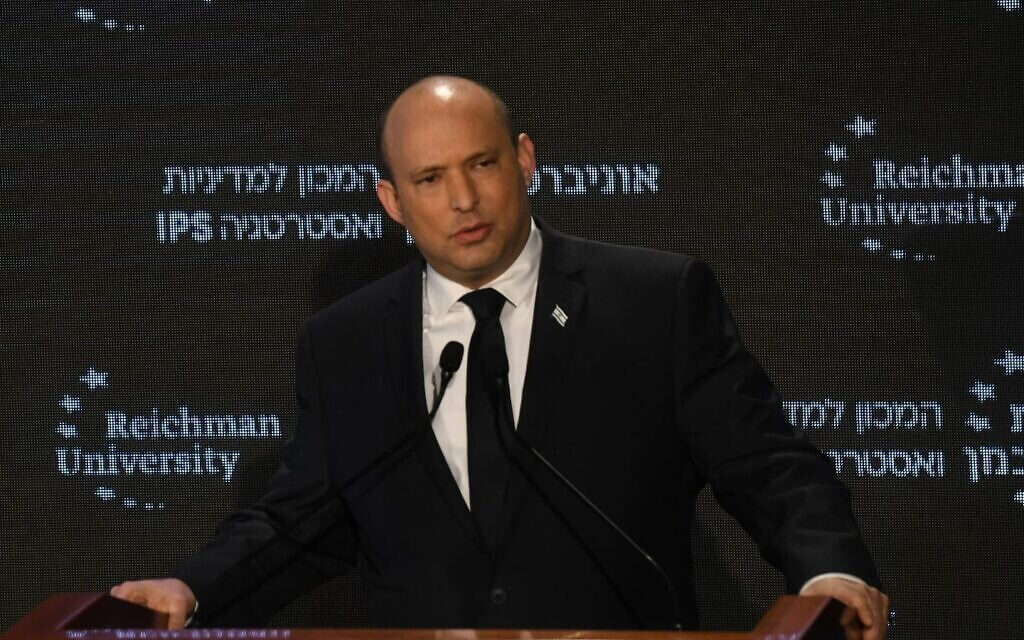Israeli Prime Minister (PM) Naftali Bennett indicated on Tuesday that Israel is ready to further escalate its ongoing conflict with Iran. Bennett also noted that Israel would not be bound by the terms of any nuclear deal reached with Iran, signalling that Israel could take independent action against the Iranian nuclear programme.
Speaking at a conference at Reichmann University in Herzliya, Bennett said that Israel needs to “recalibrate” its efforts to counter Iran. The PM opined that Israel should make use of the “tremendous” resources invested in dealing with the “Iranian threat” in the military, diplomatic, economic, and technological fields.
Talking about Iran’s nuclear programme, Bennett said, “Iran is further along in its nuclear programme than ever before and its enrichment machine is more advanced and broader.” His comments came after the International Atomic Energy Agency (IAEA) reported that Iran was enriching uranium up to 60% fissile purity, closer to the 90% weapons-grade level.
Also Read: Israeli PM Bennett Urges UNSC to “Hold Iran Accountable” For Nuclear Moves
Bennett also lamented that Israel has not done enough to counter Iran’s nuclear ambitions. He said that since the Iran nuclear deal was signed in 2015, Israel, under his predecessor Benjamin Netanyahu, “simply went to sleep” and was “occupied with other things.” However, he noted that, under his administration, Israel “will learn from this mistake [and] maintain our freedom of action.”
Furthermore, Bennett said that “even if there is a return” to the nuclear deal, Israel will not be bound by the terms set by such an agreement. “Israel obviously is not a party to the agreement and is not obligated by it,” he noted.
“Iran has also been consistently and persistently successful in encircling Israel in rings of militias and rockets from every direction,” the PM added. “The Iranians have surrounded the State of Israel with missiles while they sit safely in Tehran,” Bennett said, referring to Iranian proxies like Hezbollah in Lebanon, Hamas and Islamic Jihad in Gaza, and various Syrian militias.
Bennett concluded by saying Israel’s current response to Iran’s asymmetric warfare, which largely consists of airstrikes on Iranian proxies, is a “strategic mistake” and “plays into their hands.” He added that Israel should utilise its “relative advantages against their aggression in a more effective manner than in the past.” Keeping this in mind, he said the government must invest heavily in Israel’s economy, cyber capabilities, democracy, international legitimacy, and new technologies.
Israel has remained opposed to any nuclear deal with Iran and has repeatedly threatened to strike Iranian nuclear facilities as it views Tehran’s nuclear programme as an “existential threat.” Iran and Israel have also been engaged in a “shadow war” spanning across the Middle East, including in Lebanon, Syria, and Gaza.
Also Read: Azerbaijan is the New Front in the Expanding Iran-Israel Shadow War
Meanwhile, IAEA chief Rafael Grossi met with Iranian Foreign Minister Hossein Amir Abdollahian in Tehran on Tuesday to discuss better access for the nuclear watchdog to Iran’s nuclear sites. “The agency is seeking to continue and deepen the dialogue with the government of Iran,” Grossi said. He also remarked that it is “essential” that Iran allow access for IAEA inspectors to re-install cameras in nuclear facilities for the revival of the 2015 nuclear deal.
Crucially, Iran and world powers have agreed to resume nuclear negotiations to restore the 2015 Iran nuclear deal, formally known as the Joint Comprehensive Plan of Action (JCPOA), on November 29 in Vienna, Austria. Iran abruptly ended talks in June and the new government had stalled negotiations ever since. Tehran has also demanded that Washington remove all sanctions and guarantee that it will never withdraw from the deal once signed.

